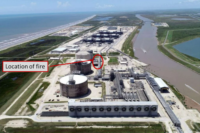ENR 2024 Top Owners Sourcebook | Oil&Gas
$1.8B Texas Oil Export Terminal OK'ed by Federal Regulator

U.S. Maritime Administration has approved a license for the deepwater Sea Port Oil Terminal, to be located 30 miles off Freeport, Texas, as well as two pipelines to shore, each 40 miles, and a 10-mile onshore line to a proposed inland terminal.
Rendering courtesy Enterprise Products Partners
Related Links:
ENR 2024 Top Owners Sourcebook (Articles)
ENR 2024 Top Owners Sourcebook (PDF)
(Subscription Required)
The U.S. Maritime Administration has approved construction of what some say is a record size offshore oil export terminal in the Gulf of Mexico 30 miles off Freeport, Texas. The project also would include two pipelines to shore, each 40 miles, and a 10-mile onshore line to a proposed inland terminal.
Developer Enterprise Products Partners, Houston, has not begun to select project engineers and contractors for the deepwater Sea Port Oil Terminal, spokesman Rick Rainey told ENR. He said it would be the largest in the U.S. but released no cost figure and declined to confirm reports it is an $1.8-billion project.
Rainey said the project will take three years to build after its final investment decision, with no timeframe provided. The approval earlier this month by the agency, part of the U.S. Transportation Dept., requires the project to be completed by Dec. 31, 2028.
The approval came shortly after a ruling by the federal appeals court in New Orleans that dismissed a lawsuit by environmental groups taking issue with federal reviews of the project. The U.S. Army Corps of Engineers and U.S. Environmental Protection Agency were among federal reviewers. “We continue to commercialize this project to support a final investment decision,” the company said in a federal filing.
The port could load 2 million barrels of crude oil per day onto large tankers, eliminating need for smaller vessels now used, which “would lessen emissions from conventional crude oil loading,” said the project record of decision.
The terminal, which would have a state-of-the-art vapor combustion system including recovery and leak detection designed to minimize emissions, would cut crude vapor emissions 95% and total greenhouse gasses 65% by eliminating more than 900 annual ship-to-ship transfers, the developer said.
Opponents disagree. “The evidence is clear [the project] would be catastrophic to the climate, wildlife and frontline communities of the Gulf,” said Sierra Club senior attorney Devorah Ancel. “We are disappointed in this decision to greenlight unprecedented oil exports that are clearly not in the public interest,” Erin Gaines, senior attorney at Earthjustice, said.
The project would allow access to up to 7 million barrels per day of oil supply from basins nearby, said S&P Global. It forecasts 2024 Texas Permian Basin crude oil output of 6.7 million b/d. But other similar port projects proposed by energy developers Phillips 66, Trafigura, Energy Transfer and Sentinel Midstream are in much earlier approval stages, S&P Global said.





